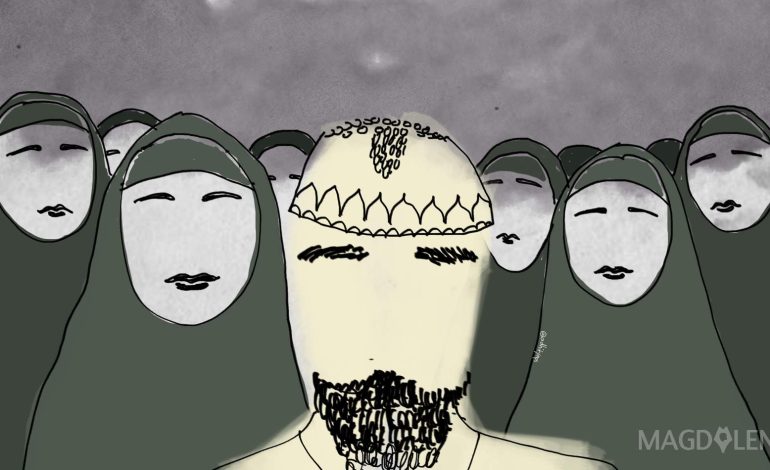I Attended a Discussion on Polygamy and This is What I Learned
Magdalene's reporter attended a discussion on the merit of polygyny, and learned a few things that surprised and appalled her.

When I set foot on Al-Azhar Great Mosque about a week ago, it was an attempt to understand the main arguments of the people who support the practice of polygamy, or rather polygyny (as Islam doesn’t allow polyandry).
I am not a supporter of polygamy, but the event “Satu Atap, Dua Cinta” (One Ceiling, Two Loves) was too intriguing to pass up. Plus, my editors assigned me to attend it. So here I was, in a cream-colored hijab I especially put on that day to blend in.
When I arrived, about two hundred people had just finished their dzuhur (noon) prayer. The audience was made up of men and women, separated by a partition. Most of the women were in a variety of long headscarves, some were fully covered in black niqab. I took a seat in the middle of the female crowd.
“When we first initiated this controversial topic for discussion, we faced challenges—and even threats. Alhamdulillah, we can all eventually sit here to discuss our theme: ‘One Ceiling, Two Loves’,” the moderator, Ustaz Bendri Jaisyurrahman, introduced the topic to the audience.
Bendri is the initiator of the public discussion “FOR US: Forum Usroh”, a public forum in which family matters are dissected from the Islamic perspective. Polygamy is their 9th topic following other issues like cheating to being single parents.
“To be honest, I am not in a polygamous marriage; I have a wife, who is also present today together with my children,” he said. “I personally believe that maintaining a harmonious family is the most important priority. However, we know, all men will eventually do polygamy at least in the afterlife.”
I looked around to see if other women were as astounded as I was upon hearing his last remark, but the audience didn’t seem bothered by it. Bendri then introduced the speaker, Erika Suryani Dewi, Lc. M.A., an Islamic cleric and lecturer at Al-Hikmah University Jakarta.
“Unlike me, she is more passionate in advocating polygamous relationship. Interesting isn’t it? She is her husband’s first wife. As a matter of fact, she was the one who proposed the idea and even looked for the second wife for her husband.” And with that he let Erika take the mic.
Erika went straight to the point by telling people that many polygamous couples had come to consult with her about their troubled polygamous marriages.
“I need to point out that it is important to learn the sharia concept first, so we can practice polygamy properly,” she said.
First off, she said, the core purposes of marriage, are two: to fulfill biological needs in a halal (lawful in Islamic teaching) way and to carry on the family tree.
“In pursuing these, there are men who feel enough with one wife and there are also men who don’t feel enough with just one,” she said.
In pre-Islamic days, she argued, women were treated horribly. Baby girls would be thrown away because they were seen as a burden, and men would keep as many as 10 wives. Prophet Muhammad attempted to reach a kind of cultural compromise by allowing men to take up more than one wife, but no more than four.
“If men in that era were having up to 10 wives, surely we understand that one wife wouldn’t be enough,” Erika said.
She herself, she said, had always longed for a polygamous marriage, even when she was young.
“I’d been wanting to be in a polygamous marriage since I was a teenage girl. I thought it would be fun to have a lot of children. Unfortunately, most women’s capability to reproduce is limited,” she added.
She reminded the audience that women were created to give birth to many children: a “pabrik anak”, a child factory, is essentially what a woman is.
“It’s important for women to quickly reproduce because their time is limited, while for men, it is always possible,” she added.
Fake Statistics
Erika claimed that one of the most urgent reasons for polygamy is an imbalance ratio of men and women in world’s population.
“The number of women these days is way too many compared to men. It used to be one man to every 13 women, now it has reached one man to 17 women. It’s also predicted that at the end of the world, there will be one man for every 50 women,” she said.
Of course, a quick Google check easily debunked this. The sex ratio is pretty balance, and, on the contrary, male population is slightly greater than female both globally and in Indonesia.
The 2012 global sex ratio is 1.01 males to 1 female. In Indonesia, the 2010 national census recorded 101 male for every 100 female. In addition, according to the National Socioeconomic Survey 2014-2015 by the National Statistics Agency, male population had reached 128.1 million, while female’s stood at 126.8 million.
Now that her fake statistics were disproved, isn’t it more logical, instead, to start advocating polyandry instead of polygyny?
But, apparently, fixing population problem is not the only concern, rather polygamy will help your girl friends to no longer be alone, like a nuptial multi-level marketing. Friends don’t let friends stay single. Friends bring them into their marriage. This, according to Erika, was the reason she asked her husband to take up a second wife: she felt sorry for her female friends who hadn’t got married yet.
“It’s God’s command to marry a person who’s still single, whether she’s a virgin or a widow,” she said. “Just because someone’s not ready for polygamy, it doesn’t mean they are denying it.”
Quran clearly approves polygyny and considers it a sunnah, which is words and acts performed by the Prophet that have become authority in Islamic teaching, she argued. All Muslims must know their rights and obligation in a marriage, she said.
All right, so, yes, the Prophet in his time supposedly married a lot of women, some of them were poor and old war widows for whom marriage was the only way to be provided for. So, we should then expect our husbands to bring home a woman who is….um… less attractive than us, right?
Apparently, not.
In helping your husband find a sister wife, apparently, we must consider these standards: wealth, beauty, ability to produce children and religious belief.
“You cannot tell your husband: ‘If you want to marry again, then marry that woman!’ while pointing to a woman who has dark skin, and who is filthy, fat and old. How could you have the heart to suggest that kind of woman to your own husband! It’s important to keep in mind that the woman you choose for your husband must fulfill the ideal standards,” she said.
What about the complication of merging more than one relationships into one? You know what men always say: having one wife is hard already, how can one possibly have four?
“It’s not supposed to be difficult,” she said. “It’s four ships with one captain, not four captains in one ship.”
I was left wondering how one captain could manage four ships.
Don’t expect total fairness
And what about jealousy? There should be no such thing, she said. Only be jealous if your husband commits adultery, but never get jealous of his other wife(s) because your husband is only doing God’s command.
In the question and answer session, a woman asked Erika whether she was wrong by demanding her husband to be fair to her. She said her husband had three wives, and he had been mostly unfair to her, the first wife.
“It’s not that I feel superior or anything, but the other wives show their aurat (intimate parts of the body that must be covered according to Islam). My husband is being unfair by treating them better than he treats me,” she asked.
This sounds like a fair demand, after all, Islam does require a man to treat all his wives equally.
However, one man from the audience was unhappy with the question. He responded passionately: “I have four wives, twelve children. I have to tell you that the most important thing is that the wives have to be ridha (fully accepting). Do not demand ‘fairness’ from the husband. Have pity on the husband who is working so hard in order to feed the family. Everybody should be ‘ridha’.”
In her apparent attempt to defuse the increasingly heated atmosphere, Erika explained the two types of “fairness” that a wife can demand from her husband in a polygamous marriage.
“The husband should definitely be fair when it comes to two things: first, in financial support. The husband needs to be fair when dividing the money. But it will not be distributed exactly equally. If the first wife has 10 children, and the second only has one, then the first one will surely have to receive more. Secondly, the husband must be fair with the ‘night shift’. For instance, one night he stays with the first wife, the next night with the second wife, or he can stay two or three nights with each wife,” she said.
“But when it comes to love and feelings, it will never be fair,” she added.
It was beginning to sound as if polygamy was, indeed, designed for sex-addicted men.
Getting family’s blessings
A man from the audience expressed his worries: “My wife already agreed (to his taking up a second wife), but then, there’s my mother. She is a tough woman, and she’s totally against it. Whenever she’s angry, all bad things came out of her mouth, which terrifies me. Do you have any suggestions on how to handle my mother, so that she will agree to a polygamous marriage? Or should I simply forget my intention?”
Erika admitted that it wasn’t easy either for her to convince her parents and in-laws but patience and perseverance in educating them about polygamy pay, she said.
“I conditioned my parents for about two years before they gave me their blessings. I told them that I wanted this, because ‘this woman’ was still single, and no one had proposed to her yet,” she said.
Another man talked about his difficulty getting his wife’s blessing: “My first wife had died. So, I married my current wife. However, during a high school reunion, I fell in love again with an old flame. She was still as pretty as she was. So I asked my wife’s blessing to marry her. My wife said, ‘Ok sure, you can marry her, but, first, you have to divorce me.’ I don’t want to divorce her, so what should I do to gain her blessing?”
Understandably, many of the women found it hard to sympathize with this man’s predicament. One woman from the audience responded to him: “I’m sorry to have to say this. Sir, but I’m so sure that what you feel is merely lust. From the way you tell the story, it’s obvious that you’re just being led by your sexual appetite. So I suggest that you focus on taking care of your current wife, and not thinking about that old flame anymore.” The audience cheered and applauded in support.
But Erika made it clear that this was not the right attitude to have when it comes to polygyny, saying the only valid opinion is “one that is based on the sharia.” Love, she said, should never blossom outside of a marriage, so it is important to find a woman who is also a devout Muslim.
But, again, she returned to her main argument: “It may take time, but eventually, the first wife must agree to the practice of polygamy, because it is what God commands.”
When the discussion ended, far from being convinced of the merit of a polygamous marriage, I thought about women who do not want her husband to take a second, or third or fourth wife, but have no choice because they are not financially independent or because of social and cultural reasons. I thought about children of polygamous marriages and how they are impacted by it. During the two-hours session, Erika repeatedly said how beautiful it was to have many children, but nothing was ever said about the challenge of parenting in a polygamous marriage.
Perhaps to these people, this was the least important part in raising a family. At least not as important as making sure that a man always has a partner who is willing to serve him every night in a warm bed, and who will bear as many children as her womb can take.
Waiting for my ojek driver to arrive, I sat at the mosque’s courtyard, staring at a bee sucking a flower, flying quickly from one to another. A man wearing a white peci walked by, behind him two women covered in black niqab. Suddenly he stopped and turned around and talked to them. The two women posed between the flowers, while he took pictures of them. One shot here, one shot there. They giggled as they walked out of the mosque’s gate.
Read Ayunda’s piece on an old Chinese community in Tangerang.












